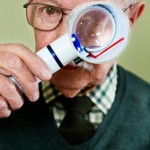One of our friends recently told my wife she'd stopped taking aspirin after a news report linked regular use of the medication to macular degeneration. We've both taken 81 mg of aspirin a day and, after I'd heard that people may not absorb the enteric coated form well (and I couldn't find any other form in that size at the local drugstore), I'd ordered ten bottles of chewable orange-flavored aspirin online from Amazon.
Then I decided to read the medical reports that our friend's recommendation had been based on. She doesn't have a medical background and hadn't looked at the original data, but instead had seen a warning in a newspaper article. Let's start at The New York Times blog. On Dec 12, 2012 they published an article by Anahad O'Conner titled "Aspirin Tied To Rare Eye Disorder."
It's a very well-worded article written by a 31-year-old, Yale-educated Times reporter who writes a weekly science column and has published two books He notes the article he based his piece on was from JAMA with the lead author, Dr. Barbara Klein, being a professor of ophthalmology at the University of Wisconsin, Madison. Since I'm a UW graduate (BS 1963, MD 1966), I was particularly interested in her study.
It used data from the Beaver Dam Eye Study, started in 1988-1990 and concluded in 2010. O'Connor very appropriately noted this was an observational study, not a prospective, controlled research project. In other words a group of ~5,000, aged 43 to 84, agreed to have regular eye exams and reports were published after the 5-, 10-, 15- and 20-year followups.More than 300 publications have resulted from this project with data supporting a relationship of cataracts and age-related macular degeneration (AMD) to cigarette smoking.
Klein's paper stated that an estimated 19.3% of US adults take aspirin on a regular basis. It's commonly recommended for anyone who has had a heart attack (secondary prevention), but many of us who've never had evidence of coronary vascular disease also take aspirin. This is primary prevention and is controversial with some data suggesting reduction of heart attacks in men over 45, but not women, although they may have a 17% reduction in stroke incidence.
A January 21,2013 article from an Australian group reported a two-fold increase in AMD of a particular type, independent of smoking habits. Nearly a quarter of regular long-term aspirin users developed neovascular AMD, two and a half times the percentage of those who did not regularly take aspirin.
A 2001 paper in the Archives of Ophthalmology reported a randomized, double-masked, placebo-controlled study of low dose aspirin (one adult tablet every other day) plus 50 milligrams of beta carotene (a vitamin A precursor rated possibly effective in treating advanced AMD) among over 20,000 US male physicians aged 30 to 84 in 1982. The study was stopped after ~5 years due to a statistically extreme reduction (44%) in first heart attacks. There were fewer cases of AMD in those taking low-dose aspirin than in those who got the placebo.
There's also some data supporting aspirin's role in cancer prevention, especially in malignancies of the colon. Here the benefit was unrelated to aspirin dose (75 mg/day and up), but increased with age.
So let me look at my own risks: my dad had a large polyp in the earliest part of the colon, an area hard to see even on colonoscopy. It was initially felt to be benign, but later had some areas of low-grade malignancy. He also had macular degeneration in his remaining eye diagnosed at age 90+ (the other eye having been removed nearly sixty years previously after a bad cut and a subsequent infection). My brother died of a heart attack at age 57 and my mother had a heart attack at age 74 with a cardiac arrest; (Dad resuscitated her and she lived to age 90).
The editorial that accompanied the recent JAMA article is thoughtful and impressive. Its title was "Relationship of Aspirin Use With Age-Related Macular Degeneration: Association or Causation?" and it concludes "From a purely science-of-medicine perspective, the strength of evidence is not sufficiently robust to be clinically directive." It then switches to a different viewpoint, the art-of-medicine perspective, saying maintaining the status quo is currently the most prudent approach, especially in secondary prevention (someone who has already had a cardiovascular event). For those of us who haven't, the risks versus benefits should be individualized based on our own medical history and value judgement.
I'm going to discuss this with my own physician but not stop taking a chewable 81 mg aspirin daily until I do.
Tags: age-related macular degeneration, aspirin side effects, colon cancer, coronary artery disease, low-dose aspirin, medical controversies


